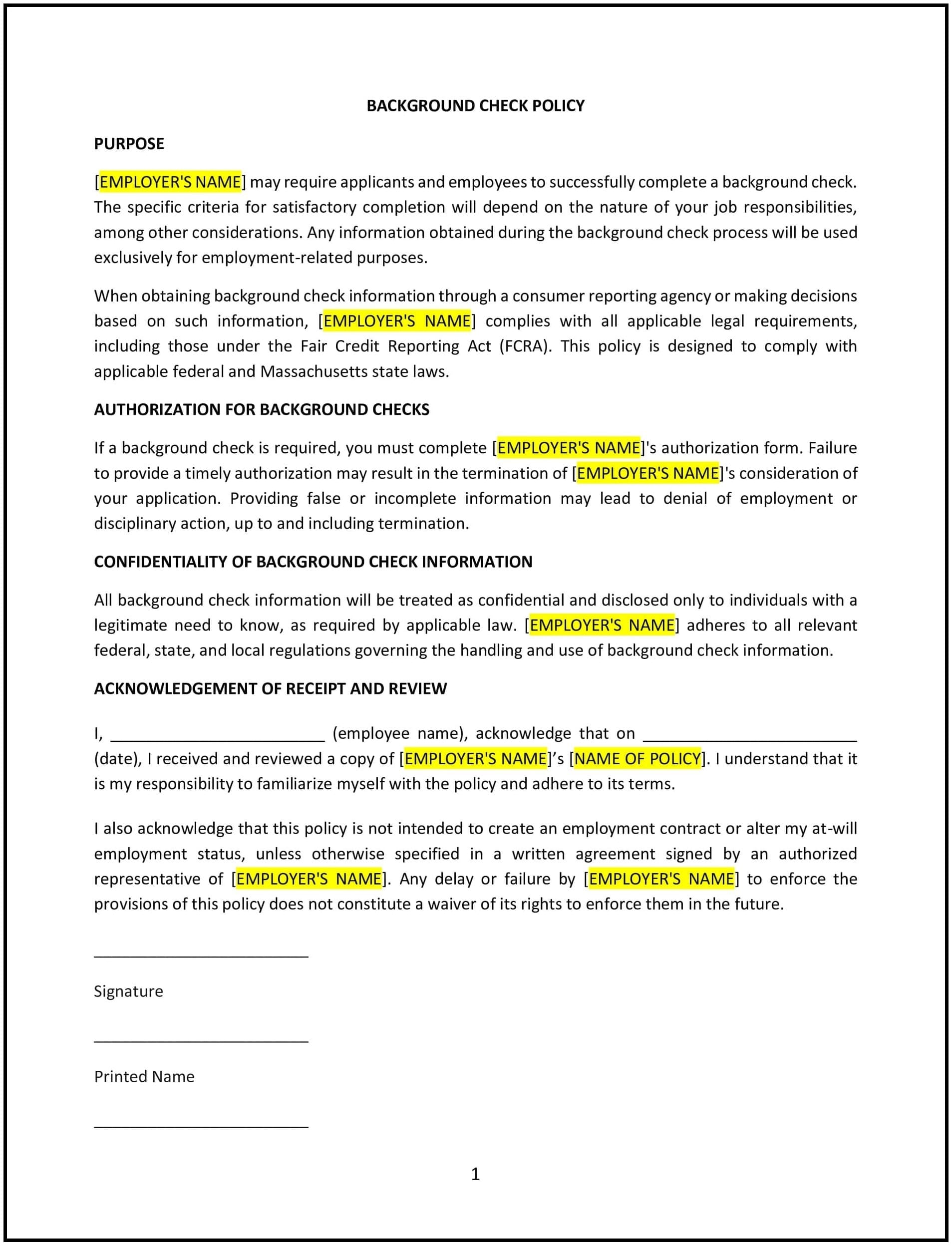Background check policy (Massachusetts): Free template
Got contracts to review? While you're here for policies, let Cobrief make contract review effortless—start your free review now.

Customize this template for free
This background check policy is designed to help Massachusetts businesses establish clear guidelines for conducting background checks on prospective and current employees. The policy outlines the company’s approach to gathering and evaluating background information, including criminal history, employment history, education verification, and other relevant checks. It also specifies how the company achieves compliance with Massachusetts state laws and federal regulations, including those related to fair hiring practices and the use of background information in employment decisions.
By adopting this policy, businesses can mitigate hiring risks, promote a fair hiring process, and strengthen compliance with state and federal laws.
How to use this background check policy (Massachusetts)
- Define the scope of background checks: Clearly outline which aspects of an employee’s background will be checked, such as criminal history, credit reports, driving records, employment history, educational qualifications, and professional licenses. Specify whether background checks will be conducted for all candidates or only for specific positions (e.g., roles requiring access to sensitive information or driving responsibilities).
- Promote legal compliance: Ensure the policy complies with Massachusetts state laws, such as the Massachusetts CORI (Criminal Offender Record Information) law, and federal regulations like the Fair Credit Reporting Act (FCRA). This includes obtaining consent from the candidate before conducting a background check and informing them of their rights, including the right to dispute any incorrect information.
- Obtain candidate consent: Clearly specify that candidates will need to provide written consent before a background check is conducted. The policy should include language that explains the purpose of the background check, how the information will be used, and that it will not be used to discriminate against candidates unfairly.
- Specify the role of background checks in the hiring process: Outline how background check results will be considered during the hiring process. Clarify that background checks will not automatically disqualify candidates, but may be one factor among many used in the hiring decision.
- Address criminal history: If criminal history is part of the background check, the policy should clearly explain how criminal records will be evaluated. Massachusetts law prohibits discrimination based solely on arrest records and certain criminal convictions, so the policy should explain how candidates with criminal records will be assessed on a case-by-case basis.
- Provide an adverse action process: Specify the steps the company will take if a candidate’s background check raises concerns. This includes providing the candidate with the results of the background check and giving them an opportunity to explain any discrepancies or concerns before making a final decision.
- Protect candidate privacy: Ensure that the background check process is conducted in a manner that respects candidates’ privacy rights, and specify how sensitive information will be handled, stored, and disposed of securely.
- Set procedures for internal background checks: If applicable, specify how background checks will be conducted on current employees, including the frequency of checks and how the results will be used in decision-making (e.g., for promotion or transfer opportunities).
Benefits of using this background check policy (Massachusetts)
This policy offers several benefits for Massachusetts businesses:
- Mitigates hiring risks: Conducting thorough background checks helps businesses reduce the risk of hiring individuals who may pose a safety or security risk to the organization or its employees.
- Promotes fairness and consistency: By establishing clear guidelines for background checks, businesses ensure that the process is applied consistently to all candidates, promoting fairness and reducing the risk of discrimination claims.
- Strengthens legal compliance: A well-structured policy helps achieve compliance with Massachusetts state laws, federal regulations, and other relevant legal requirements regarding background checks, protecting the company from legal liabilities.
- Enhances hiring decisions: Background checks provide valuable information that can help businesses make more informed hiring decisions, ensuring that they hire candidates who meet the company’s standards and values.
- Protects company reputation: By conducting thorough background checks, businesses can safeguard their reputation by ensuring that their workforce is trustworthy, reliable, and qualified.
- Reduces turnover and workplace risks: By hiring individuals with clean and appropriate backgrounds, businesses can reduce the likelihood of workplace misconduct, criminal behavior, or other issues that may arise after hiring.
Tips for using this background check policy (Massachusetts)
- Communicate the policy clearly: Ensure that all job applicants and employees are informed about the background check policy, including the types of checks conducted, the consent process, and how background information will be used in hiring decisions.
- Obtain written consent: Make sure that candidates understand and consent to background checks before they are conducted. Consent should be documented in writing, as required by the Fair Credit Reporting Act (FCRA).
- Treat all candidates equally: Apply the background check policy consistently to all candidates for a given position to avoid claims of discrimination. Ensure that background check results are considered as part of a holistic review of the candidate’s qualifications.
- Use background checks appropriately: Ensure that background checks are used to assess candidates' qualifications and potential risks, not as a tool for discrimination. Consider the nature of any criminal convictions and how they relate to the responsibilities of the job.
- Handle sensitive information securely: Ensure that all background check information is stored securely and that only authorized personnel have access to it. Dispose of outdated or irrelevant information properly to protect candidates’ privacy.
- Review and update regularly: Periodically review and update the policy to ensure it complies with Massachusetts state laws, federal regulations, and any changes in business practices or industry standards.